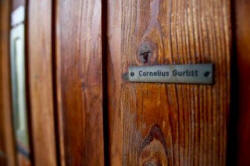 Authorities stumbled upon Cornelius Gurlitt's trove
of paintings and drawings by the likes of Marc
Chagall, Toulouse-Lautrec and Picasso in 2012 after
a routine check on a train from Switzerland turned
up wads of cash, triggering a tax inquiry.
Authorities stumbled upon Cornelius Gurlitt's trove
of paintings and drawings by the likes of Marc
Chagall, Toulouse-Lautrec and Picasso in 2012 after
a routine check on a train from Switzerland turned
up wads of cash, triggering a tax inquiry.His spokesman, Stephan Holzinger, said the 81-year-old Gurlitt had decided to return home, looked after by his doctor and a nurse after a complicated heart operation, and spend his final days in the Munich flat that once housed part of his beloved collection.
Gurlitt's collection of 1,280 artworks was assembled by his father Hildebrand, an art dealer put in charge of selling what Adolf Hitler called "degenerate" art, and ordered to be removed from state museums to help fund the Nazis' war effort.
Now worth an estimated 1 billion euros ($1.4 billion), the hoard remained undetected for decades in the Munich flat and a house over the Austrian border in Salzburg. Gurlitt sold pieces occasionally to finance his quiet lifestyle and his healthcare.
"I haven't loved anything more than my pictures in my life. But hopefully it will all be cleared up soon and I will finally get my pictures back," he told German magazine Der Spiegel in a rare interview last November, when he was already very frail.
But a lawyer for one U.S.-based claimant said Gurlitt's death should mean that German authorities have fewer reasons for delaying the return of looted artworks to their rightful heirs.
"Mr Gurlitt's death, if anything, gives them fewer excuses for not turning the painting over immediately," said August Matteis, a Washington-based attorney for American claimant David Toren, a retired lawyer who has a claim on "Two Riders on the Beach" by German Impressionist Max Liebermann, who was Jewish.
Toren, 88, is an heir of David Friedmann, an industrialist from Breslau who owned the painting from at least 1905 to 1939. Toren told Reuters last year he could remember the picture hanging on the wall of his great uncle's villa before the war.
Friedmann died in 1942. Toren escaped from Germany and spent the war in Sweden. His older brother reached the Netherlands and now lives in London, but their parents perished at Auschwitz.
The Liebermann painting was among the first works from the hoard to be posted by German authorities on their "Lost Art" website (www.lostart.de) to help establish provenance. But Matteis said there had been no progress in his client's case.







